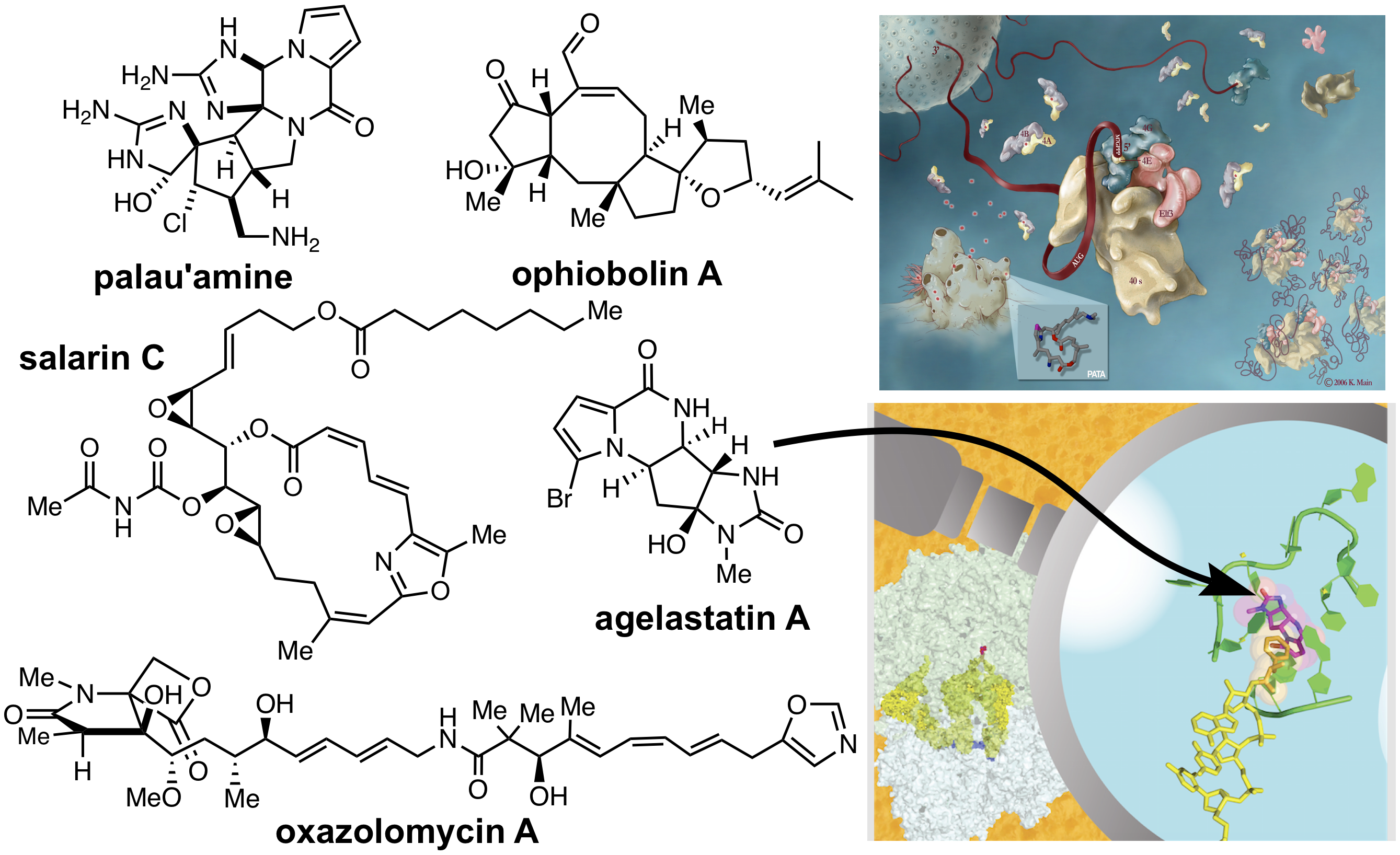
Romo Group Research Synopsis
At the heart of our research interests are the Chemistry and Biology of natural products, enduring leads for basic cell biology studies and drug development. These are unique and often structurally complex molecules that are designed to interact in highly specific ways with various cellular receptors and by homology those found in humans. Thus, all our projects begin with natural products encompassing development of novel synthetic strategies towards these naturally occuring compounds or derivatives that in turn serve as useful leads for inquiries into cell Biology.

For a list of our completed total syntheses, click HERE.
'Pharmacophore-Directed Retrosynthesis'.
This is a new approach toward the pursuit of natural product total synthesis that enables a synthetic chemist to get involved with structure-activity relationship studies of natural products very early in the synthetic effort. Natural products in ths category that are currently being pursured include oxazolomycin and the gracillins. Thus, we attempt to make use of our methodology to access natural products that we in fact plan to pursue further in terms of biological studies. Biological studies of the gracillins and spongiolactone/oxazolomycin are supported by excellent collaborations with Prof. Luis Botana (Spain) and Prof. Stephan Sieber (Germany), respectively.
Exploiting the Potential of Chiral Unsaturated Acylammonium Salts.
We recently discovered and are continuing to mine the rich potential of this readily available chiral intermediate derived from commercially available acid chlorides and catalysts. Numerous other organocascade processes are waiting to be discovered that make full use of the triple reactivity of this versatile intermediate! Computational studies in collaboration with Prof. Dean Tantillo (UC Davis) and mechanistic studies (e.g. in situ IR, LC-MS) are being pursued in connection with our methodological studies. For more information, click here.
Mass Spectrometry-Based Profiling of the Cancer Proteome with Anticancer Natural Products.
Using numerous cancer cell lysates that are now commercially available, we will study the interactions of several, putative natural product-based covent modifiers of cellular proteins that are being synthesized in the lab. These in vitro experiments will provide initial data regarding protein targets of these natural products. Further experiments to validate these targets, including the use of isotopically labelled proteomes (SILAC) and over-expression of putative targets in cell lines will be conducted in the laboratories of collaborators, and students will be allowed to visit for short stays (e.g. with Prof. Jun Liu, Johns Hopkins University, Department of Pharmacology, or Prof. Stephan Sieber, Tech. Univ. of Muchich, Germany, or with Prof. Ben Cravatt, Scripps, CA).
Molecular Level Mode of Action Studies of Natural Products.
We bring to bear the full range of organic methods including microscale derivatization developed in our group (including microscale purification and characterization enabled by a new Brucker LC-SPE-NMR) and total synthesis to fully understand the mechanism of action of a bioactive natural product, including detailed structure-activity relationships and the use of either affinity chromatography or activity-based proteomic profiling. Current pursuits in this area include rameswaralide, ophiobolin, and agelastatin A (all nanomolar inhibitors of various cancer cell lines). These studies are greatly bolstered by interactions with scientists working in the Natural Products CPRIT Laboratory and a fruitful long term collaboration with Prof. Jun Liu (Johns Hopkins) and more recent collaboration with Prof. Alex Kornienko (Texas State U.).
Baylor CPRIT Synthesis and Drug Lead Discovery Laboratory.
This Collaboration Center is focused on the application of strategies being developed in our group to more rapidly couple a natural product with its cellular protein target. In addition, scientists assis in traslating novel drug leads to therapeutic lead compounds and diagnostics by assistance with scale-up and further structure-activity relationships studies. Importantly, students in our group frequently interact with research scientists in this laboratory including co-director, Dr. Ken Hull, who has over 20 years of pharma experience. For more information on the CPRIT lab, visit: baylorcpritlab.com.
CLICK HERE TO DOWNLOAD RESEARCH SYNOPSIS



